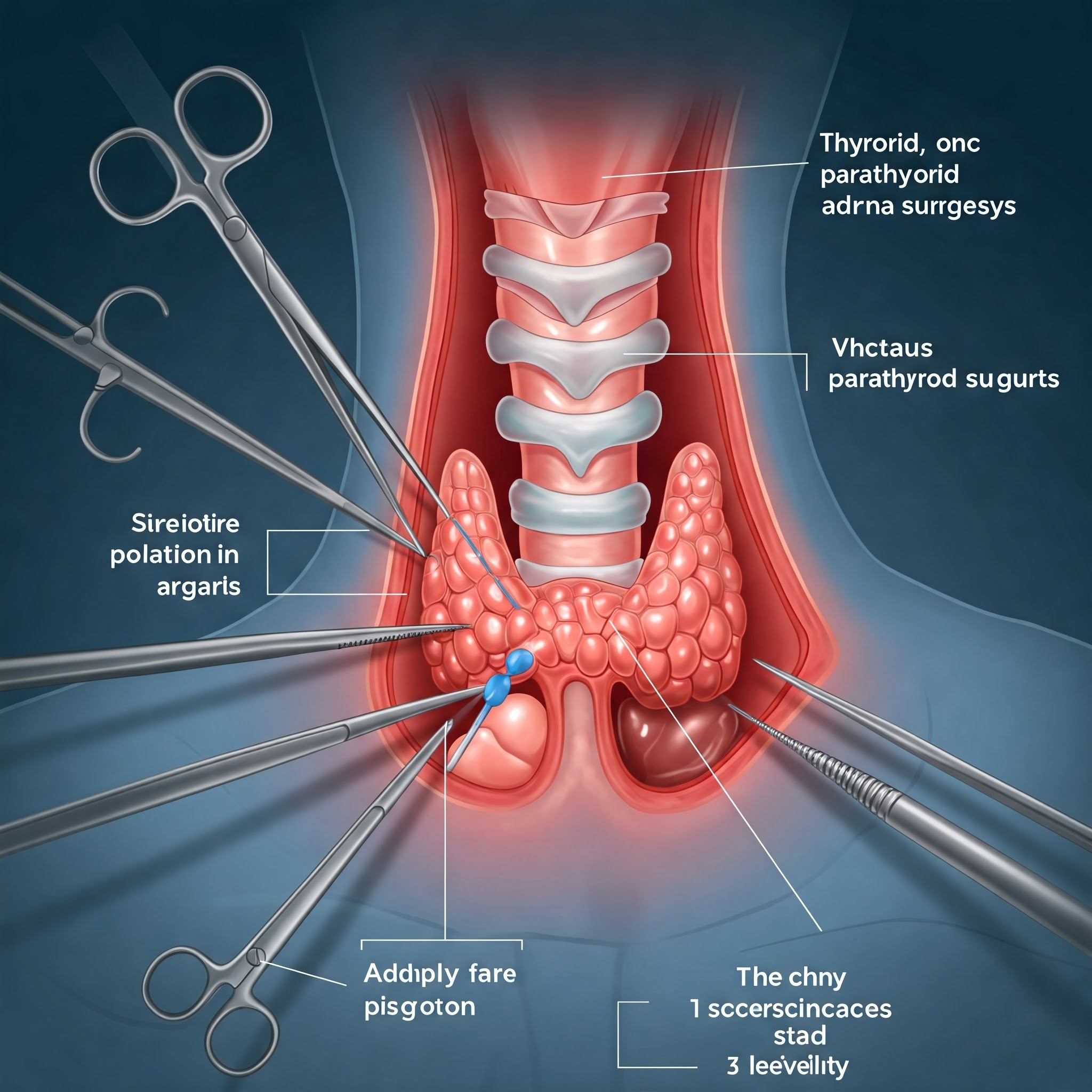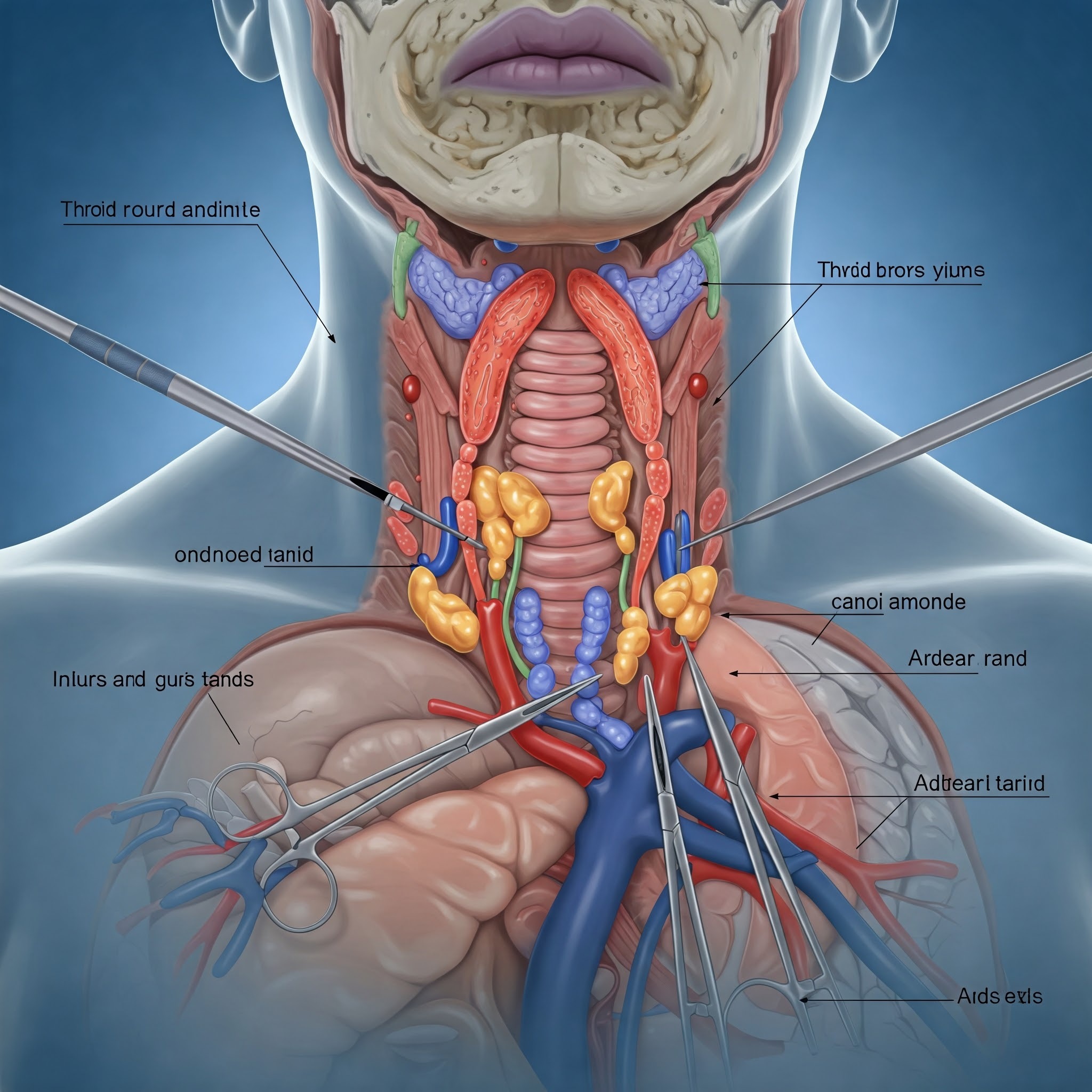Thyroid/Para-thyroid/Adrenal Surgery
Expert endocrine surgery for optimal health
Specialized care for thyroid, parathyroid, and adrenal gland disorders
At Neo-Woman, our Endocrine Surgery Clinic provides comprehensive, patient-centered care for conditions affecting the endocrine system. Our experienced endocrine surgeons specialize in performing precise, minimally invasive procedures to address disorders of the thyroid, parathyroid, and adrenal glands. We utilize advanced diagnostic techniques to ensure accurate assessments and tailor surgical plans to each patient’s needs.
Endocrine disorders can significantly impact your overall health, from hormonal imbalances to growth abnormalities. Our team offers expert guidance and state-of-the-art endocrine surgeries to restore hormonal balance and improve quality of life. Whether you’re seeking thyroid surgery for benign nodules or adrenal surgery for hormone-producing tumors, we prioritize safety, comfort, and optimal outcomes.
Our multidisciplinary approach ensures seamless coordination between endocrinologists, surgeons, and support staff for holistic care. Trust Neo-Woman for advanced endocrine surgery with compassionate, personalized attention.


Endocrine surgery: expert care for thyroid, parathyroid, and adrenal health
Our specialized Endocrine Surgery services address conditions affecting the thyroid, parathyroid, and adrenal glands. Using advanced techniques, our surgeons remove abnormal growths, tumors, or dysfunctional tissue while preserving hormonal balance. We offer personalized treatment plans and continuous monitoring to ensure optimal endocrine health.
- Understanding thyroid disorders: when surgery becomes necessary
Thyroid disorders, particularly conditions like goiter, hyperthyroidism, and thyroid nodules, may require surgical intervention when medications and other treatments are insufficient. Thyroid surgery, such as thyroidectomy, is often recommended when there’s a risk of cancer, difficulty breathing or swallowing, or persistent symptoms despite non-surgical treatments. Early diagnosis through blood tests, ultrasound, and fine-needle aspiration biopsy is crucial. Surgery helps restore normal function, alleviate symptoms, and prevent complications. The procedure is typically safe, with advancements like minimally invasive techniques reducing recovery time. Post-surgery, patients are closely monitored for hormonal balance, ensuring the thyroid’s essential role in regulating metabolism, energy, and growth continues to be managed effectively with hormone replacement therapy if necessary.
Here are some of the check up and health screenings that you should get done:
- Pelvic Exam
- Pap Smear (Cervical Cancer Screening)
- Breast Exam
- Blood Pressure Measurement
- Cholesterol Screening
- Bone Density Scan (DXA)
- Blood Sugar Test (Glucose Screening)
- Thyroid Function Tests
- Blood Count (Complete Blood Count, CBC)
* The specific exams and screenings recommended can vary based on a woman’s age, family history, personal health history, and risk factors. It’s essential to discuss your individual healthcare needs and screening schedule with your healthcare provider.
- Surgical treatment of hyperparathyroidism: what you need to know
Hyperparathyroidism occurs when one or more parathyroid glands produce excess parathyroid hormone (PTH), leading to elevated calcium levels and associated complications like osteoporosis and kidney stones. Parathyroidectomy, the surgical removal of the overactive glands, is the primary treatment for primary hyperparathyroidism. Pre-surgery imaging, including sestamibi scans and ultrasounds, helps identify the affected gland. The procedure, often performed with minimally invasive techniques, has a high success rate and provides immediate relief from symptoms. Recovery is generally quick, with most patients resuming normal activities within days. Monitoring calcium levels post-surgery is essential to prevent complications like hypocalcemia. Educating patients about the condition, symptoms, and the importance of regular follow-ups ensures long-term success.
- Adrenal gland surgery: procedure, recovery, and benefits
Adrenal gland surgery, or adrenalectomy, is performed to remove benign or malignant tumors affecting hormone production. Conditions such as pheochromocytoma, Cushing’s syndrome, and aldosteronoma often necessitate this surgery. The procedure can be conducted using minimally invasive laparoscopic techniques, which involve small incisions, less pain, and faster recovery compared to open surgery. Preoperative evaluation includes hormonal testing and imaging studies like CT scans or MRIs. During surgery, care is taken to avoid hormone fluctuations, particularly in cases involving cortisol-producing tumors. Postoperative care involves hormone level monitoring and possible hormone replacement therapy. The procedure significantly improves symptoms like hypertension, weight gain, and fatigue, enhancing the patient’s overall quality of life.
- Women and thyroid health: recognizing symptoms early
Thyroid disorders are more prevalent in women, especially during periods of hormonal changes such as pregnancy, menopause, and puberty. Common conditions include hypothyroidism, hyperthyroidism, thyroid nodules, and thyroid cancer. Early symptoms may include fatigue, weight changes, hair thinning, and mood fluctuations. Diagnosing thyroid conditions early through blood tests for TSH, T3, and T4, along with ultrasound examinations, is critical to determining the appropriate treatment. Surgery may be required for suspicious nodules or cancerous growths. Post-surgical care focuses on maintaining hormonal balance with thyroid hormone replacement therapy. Raising awareness about these symptoms, especially among women with a family history of thyroid disorders, helps in early detection and timely medical intervention.
- Minimally invasive endocrine surgeries: safe and effective options
Endocrine surgeries, including thyroidectomy, parathyroidectomy, and adrenalectomy, have evolved with the advent of minimally invasive techniques. These procedures involve smaller incisions, reduced scarring, less pain, and quicker recovery times compared to traditional open surgeries. Laparoscopic and robotic-assisted surgeries have become standard for many endocrine conditions, including tumors and hormone-secreting gland disorders. Preoperative imaging, such as MRI, CT scans, and ultrasound, helps precisely locate the affected glands. Intraoperative monitoring ensures accurate removal while preserving surrounding tissues and nerves. Post-surgery, patients experience fewer complications and a faster return to daily activities. These advancements not only improve clinical outcomes but also enhance patient comfort and satisfaction, making endocrine surgeries safer and more accessible.

Frequently asked questions
What symptoms indicate a need for thyroid surgery?
Enlarged thyroid, difficulty swallowing, or abnormal hormone levels might warrant surgical intervention.
How is endocrine surgery performed?
Surgery may involve removing all or part of the gland using minimally invasive techniques.
What are the risks of thyroid or adrenal surgery?
Potential risks include nerve damage, hormone imbalances, or calcium level changes.
How long does recovery take?
Most patients recover within a few weeks, although hormone regulation may take longer.
Will I need hormone replacement therapy?
If the thyroid or adrenal glands are completely removed, lifelong hormone therapy may be necessary.
Disclaimer: Results and patient experiences may vary. These are dependent on a number of factors including age, medical history, lifestyle and more.

Service line
Our locations
Neo-woman clinic
Apte Road
1212, Apte Rd, opp. Centro Hotel, Shirole Road, Shivajinagar, Pune, Maharashtra 411004
Contact us at: 9423039292
Our locations
Neo-woman clinic
Hadapsar
Gandharva Empire, 3rd floor, Above Fab India, Raskar Chowk, Amanora Park, Hadapsar, Pune, Maharashtra 411036
Contact us at: 7030114488
Copyright © 2026 neo-Woman – all rights reserved.
:::| powered by dimakh consultants |:::